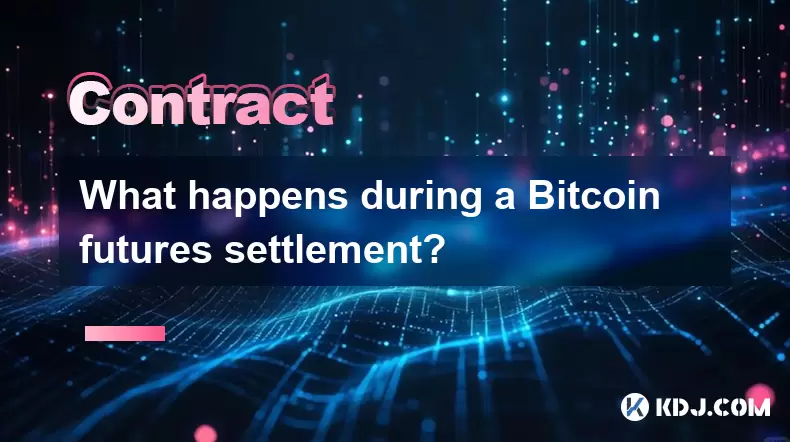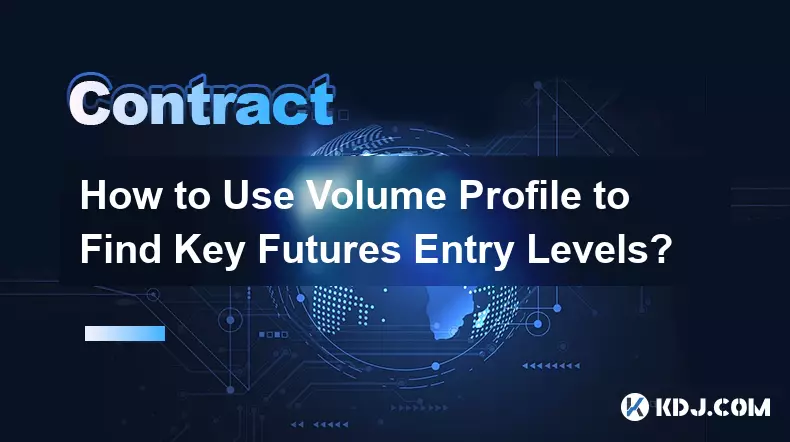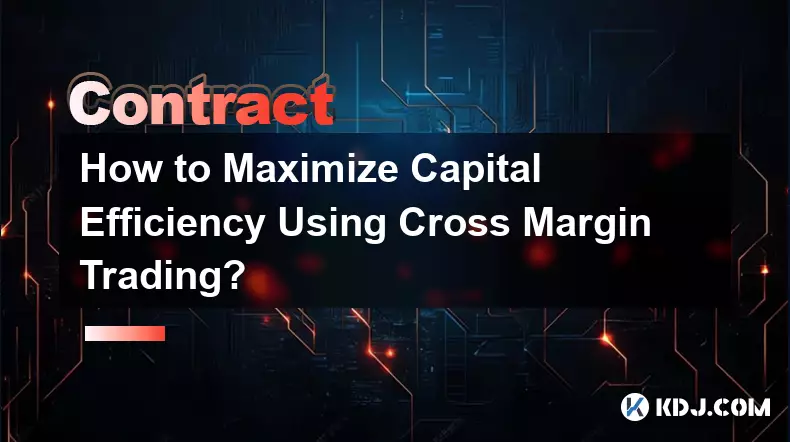-
 bitcoin
bitcoin $87959.907984 USD
1.34% -
 ethereum
ethereum $2920.497338 USD
3.04% -
 tether
tether $0.999775 USD
0.00% -
 xrp
xrp $2.237324 USD
8.12% -
 bnb
bnb $860.243768 USD
0.90% -
 solana
solana $138.089498 USD
5.43% -
 usd-coin
usd-coin $0.999807 USD
0.01% -
 tron
tron $0.272801 USD
-1.53% -
 dogecoin
dogecoin $0.150904 USD
2.96% -
 cardano
cardano $0.421635 USD
1.97% -
 hyperliquid
hyperliquid $32.152445 USD
2.23% -
 bitcoin-cash
bitcoin-cash $533.301069 USD
-1.94% -
 chainlink
chainlink $12.953417 USD
2.68% -
 unus-sed-leo
unus-sed-leo $9.535951 USD
0.73% -
 zcash
zcash $521.483386 USD
-2.87%
What happens during a Bitcoin futures settlement?
Bitcoin futures settlement concludes contracts via cash or physical Bitcoin delivery, determining final gains or losses for traders.
Jul 16, 2025 at 02:01 pm

Understanding Bitcoin Futures Settlement
Bitcoin futures settlement refers to the process by which a futures contract tied to the price of Bitcoin reaches its conclusion, either through physical delivery or cash settlement. Unlike spot trading, where assets are bought and sold immediately, futures contracts involve agreements to buy or sell an asset at a predetermined price on a specified future date.
The settlement process is crucial for traders and institutional investors who use Bitcoin futures to hedge positions, speculate on price movements, or gain exposure without holding actual Bitcoin.
Settlement occurs when the futures contract expires, and it can take two forms: physical delivery or cash settlement.
Types of Bitcoin Futures Contracts
There are primarily two types of Bitcoin futures contracts offered by major exchanges:
- Physically Settled Contracts: In this model, the underlying asset — Bitcoin — is delivered upon expiration. The buyer receives the agreed-upon amount of Bitcoin, and the seller delivers it.
- Cash-Settled Contracts: These contracts settle in fiat currency or stablecoins based on the reference price of Bitcoin at expiration. No actual Bitcoin changes hands.
Each type has implications for traders depending on their objectives, risk appetite, and whether they want to hold Bitcoin directly.
Exchanges like CME (Chicago Mercantile Exchange) offer both types of contracts with strict rules governing their execution and settlement mechanisms.
The Role of Mark-to-Market in Futures Trading
Before reaching the settlement phase, Bitcoin futures undergo daily mark-to-market adjustments. This means that the value of open positions is recalculated each day based on the closing price of the futures contract.
This process affects margin accounts:
- If the contract moves against a trader's position, additional margin may be required.
- If the contract moves favorably, profits are credited to the trader’s account.
These adjustments ensure that both parties remain solvent throughout the life of the contract.
Daily mark-to-market valuation ensures that counterparty risk remains low and liquidity is maintained across the market.
How Is the Settlement Price Determined?
One of the most critical aspects of futures settlement is how the final price is determined. Exchanges use specific methodologies to calculate the settlement price, often derived from:
- A time-weighted average of Bitcoin prices over a defined period before expiration.
- Reference data from multiple exchanges to prevent manipulation and ensure fairness.
For example, CME uses a Bitcoin Reference Rate (BRR) calculated from trades on major cryptocurrency exchanges during a 1-hour window shortly before contract expiration.
The settlement price is not simply the last traded price but a carefully constructed benchmark to reflect true market conditions.
What Happens After Settlement?
Once the settlement price is determined, the obligations of both the long and short positions are fulfilled according to the terms of the contract.
In case of cash-settled contracts:
- Profits or losses are settled in fiat or stablecoin.
- Positions are automatically closed.
- Funds are transferred to respective accounts within a few business days.
In case of physically delivered contracts:
- The short party must deliver the exact amount of Bitcoin as per the contract.
- The long party pays the agreed-upon amount in fiat or crypto.
- Delivery is typically handled via secure wallet transfers governed by exchange protocols.
Post-settlement processes vary significantly between cash and physical delivery models, affecting liquidity, custody requirements, and settlement timelines.
Common FAQs About Bitcoin Futures Settlement
Q: Can retail traders participate in physically settled Bitcoin futures?A: Yes, though many retail platforms only support cash-settled contracts due to the complexities involved in handling actual Bitcoin deliveries.
Q: What happens if I don’t close my position before expiration?A: If you hold a futures contract until expiration, it will automatically settle according to the rules of the exchange — either through cash transfer or physical delivery.
Q: Are there tax implications during Bitcoin futures settlement?A: Tax treatment varies by jurisdiction, but realized gains or losses from futures settlement are generally taxable events under capital gains rules.
Q: How do settlement procedures affect leverage in Bitcoin futures trading?A: Leverage allows traders to control large positions with small capital, but during settlement, leveraged positions can result in significant gains or losses depending on the final settlement price.
Disclaimer:info@kdj.com
The information provided is not trading advice. kdj.com does not assume any responsibility for any investments made based on the information provided in this article. Cryptocurrencies are highly volatile and it is highly recommended that you invest with caution after thorough research!
If you believe that the content used on this website infringes your copyright, please contact us immediately (info@kdj.com) and we will delete it promptly.
- Bitcoin Drops Amidst Analyst Warnings and Shifting Market Sentiment
- 2026-02-05 09:40:02
- Georgia Brothers Sentenced to 20 Years for Elaborate COAM Gambling Fraud Scheme
- 2026-02-05 09:45:01
- MicroStrategy Stock Loss: Pension Funds Face 60% Plunge Amidst Crypto Volatility
- 2026-02-05 10:55:01
- Super Bowl LX: Teddy Swims, Green Day, and a Legacy Toss Set for 2026 Extravaganza
- 2026-02-05 07:20:02
- Fantasy Football Premier League Round 25: Key Player Picks, Tips, and Advice for Optimal Team Performance
- 2026-02-05 07:15:02
- Remittix Launches PayFi Platform with a Generous 300% Bonus Offer, Driving Investor Excitement
- 2026-02-05 07:05:01
Related knowledge

How to Manage Emotions and "Revenge Trading" in Futures?
Feb 05,2026 at 12:19am
Understanding Emotional Triggers in Futures Markets1. Market volatility directly impacts psychological states, often amplifying fear or euphoria based...

How to Analyze Market Sentiment Using the Fear and Greed Index?
Feb 05,2026 at 07:40am
Understanding the Fear and Greed Index1. The Fear and Greed Index is a composite metric designed to quantify prevailing emotional states among cryptoc...

How to Use Volume Profile to Find Key Futures Entry Levels?
Feb 04,2026 at 11:39pm
Understanding Volume Profile Structure1. Volume Profile displays the distribution of traded volume at specific price levels over a defined time period...

How to Trade Bitcoin Futures with 100x Leverage? (High-Risk Setup)
Feb 05,2026 at 11:00am
Understanding Bitcoin Futures Mechanics1. Bitcoin futures contracts represent agreements to buy or sell BTC at a predetermined price and date in the f...

How to Maximize Capital Efficiency Using Cross Margin Trading?
Feb 05,2026 at 12:40am
Cross Margin Trading Fundamentals1. Cross margin trading allows traders to use their entire account balance as collateral for open positions across mu...

How to Trade Crypto Contracts During Major News Events? (CPI/FOMC)
Feb 05,2026 at 09:59am
Understanding Market Sensitivity to Macro Data Releases1. Cryptocurrency futures markets exhibit pronounced volatility during U.S. CPI and FOMC announ...

How to Manage Emotions and "Revenge Trading" in Futures?
Feb 05,2026 at 12:19am
Understanding Emotional Triggers in Futures Markets1. Market volatility directly impacts psychological states, often amplifying fear or euphoria based...

How to Analyze Market Sentiment Using the Fear and Greed Index?
Feb 05,2026 at 07:40am
Understanding the Fear and Greed Index1. The Fear and Greed Index is a composite metric designed to quantify prevailing emotional states among cryptoc...

How to Use Volume Profile to Find Key Futures Entry Levels?
Feb 04,2026 at 11:39pm
Understanding Volume Profile Structure1. Volume Profile displays the distribution of traded volume at specific price levels over a defined time period...

How to Trade Bitcoin Futures with 100x Leverage? (High-Risk Setup)
Feb 05,2026 at 11:00am
Understanding Bitcoin Futures Mechanics1. Bitcoin futures contracts represent agreements to buy or sell BTC at a predetermined price and date in the f...

How to Maximize Capital Efficiency Using Cross Margin Trading?
Feb 05,2026 at 12:40am
Cross Margin Trading Fundamentals1. Cross margin trading allows traders to use their entire account balance as collateral for open positions across mu...

How to Trade Crypto Contracts During Major News Events? (CPI/FOMC)
Feb 05,2026 at 09:59am
Understanding Market Sensitivity to Macro Data Releases1. Cryptocurrency futures markets exhibit pronounced volatility during U.S. CPI and FOMC announ...
See all articles










































































